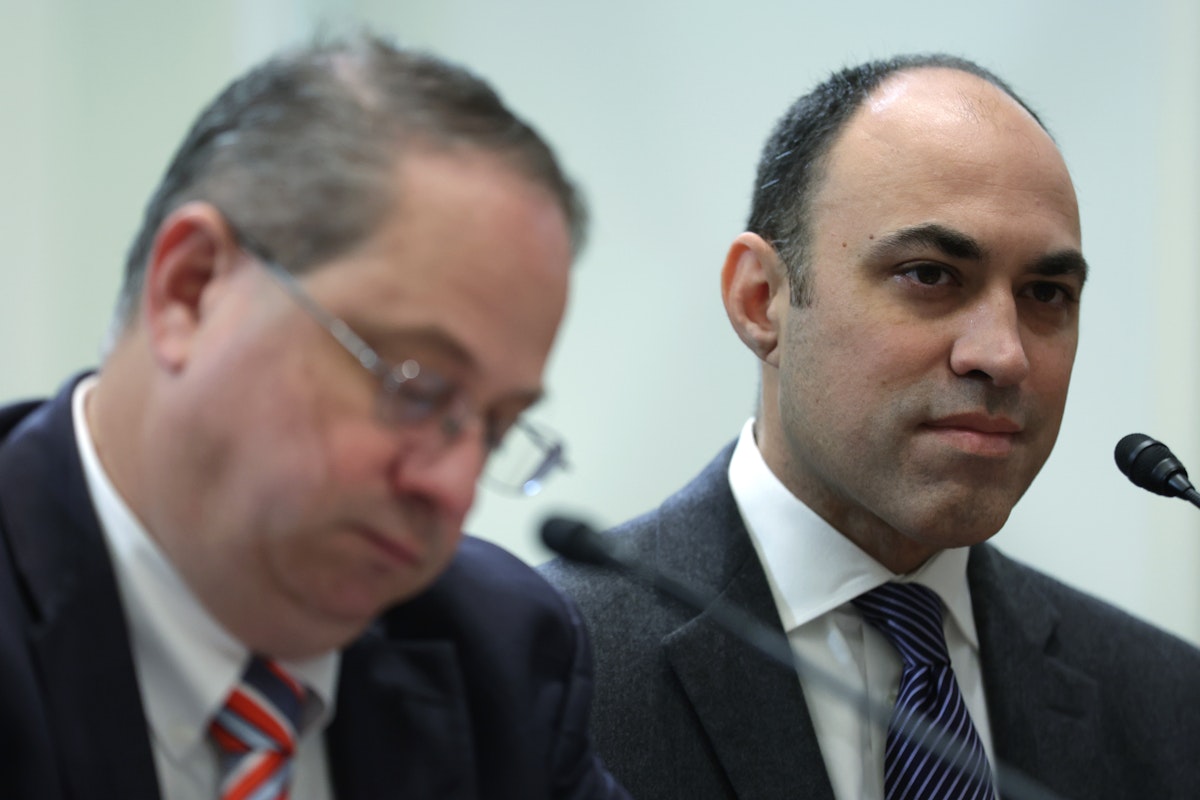Our Money-in-Politics Problem Just Got Worse
If you’re a big fan of money in politics, then the Federal Election Commission made your day last week with two important moves: one that could open the floodgates in the funding of state ballot initiatives, and another that could further obscure the sources of funding in American elections.The first move was prompted by Nevadans for Reproductive Freedom, or NFRF, a political action committee attempting to place a ballot initiative establishing a state constitutional right to abortion. Earlier this year, the group requested an advisory opinion from the FEC on whether federal candidates could help it with fundraising drives. Last week, the six-member commission said, in effect, Yes, that’s OK.Federal election law regulates how much money candidates for federal elections can raise and spend in connection with “an election for federal office” or “any election other than an election for federal office.” NFRF successfully argued before the commission that these categories did not include state ballot initiatives, constitutional amendments, and other types of referenda, which by definition do not have candidates for office—and thus, a federal candidate like President Biden or Donald Trump could raise unlimited funds for such referenda.“The definitions of ‘election’ in the [Federal Election Campaign] Act and [FEC] regulations are limited to individuals seeking office, whereas the ballot initiative process allows voters to directly enact a proposed statute or constitutional amendment,” the commission explained. It noted that the Supreme Court had previously concluded that the law in question “regulates only candidate elections, not referenda or other issue-based ballot measures.”The most immediate impact will be felt in states where abortion-related initiatives are on the ballot this fall, as is expected in the battlegrounds states of Nevada and Arizona as well as the former battleground of Florida. Given how the Supreme Court’s overturning of Roe v. Wade two years ago has energized voters to support Democratic candidates in state and local elections since then, the Biden campaign is undoubtedly licking its chops in the wake of the FEC’s decision. Theoretically, it can now beseech donors, whose contributions to the president’s campaign are limited by law, to give as much money as they want to anti-abortion referenda, knowing that this will almost certainly boost his reelection chances, too. But the FEC decision won’t be to Democrats’ benefit alone. In the long run, the decision may prove to be a loophole of sorts for presidential candidates from both major parties, allowing them to circumvent donor limits by tying their get-out-the-vote efforts to voter referenda.Another major shift may be on the horizon. Last week, FEC Commissioner Allen Dickerson requested that the commission consider making it easier for political groups to conceal information about their donors in their public filings with the commission. The new procedure, if approved by the commission, could be a sea change in the FEC’s disclosure requirements.Under federal law, political committees—campaigns, PACs, superPACS, and so on—must generally file regular reports with the FEC on their financial status. That includes disclosing the name of every individual donor who contributed $200 or more to the committee, as well as some personally identifying information like their occupation, mailing address, and employer. These reports are essential for ensuring that donors do not exceed the individual cap on political donations, as well as for keeping a committee’s funding sources transparent for the public.Dickerson, a Trump appointee who joined the commission in late 2020, cited the country’s “charged political atmosphere” as one reason to adopt his proposed rule. “This is a Constitutional right—Americans are entitled to make political contributions without being attacked, threatened, or fired—but it is also common sense and the right thing to do,” he said.Looming in the background of this discussion is the Supreme Court. Some groups have fought back against disclosure requirements on First Amendment grounds. Such laws have often faced legal challenges that argue that disclosure infringes upon the right to assembly and chills political speech. The court has historically upheld most donor-disclosure rules, both to keep voters informed and to help enforce anti-corruption provisions in federal election law.In recent years, however, the Roberts Court has also struck down some disclosure requirements in other contexts. In the 2021 case Americans for Prosperity Foundation v. Bonta, the court voted 6-3 along the usual lines to strike down a California law that required charities to report their donors’ names and addresses to the state attorney general’s office. The state had argued that the requirement was necessary to police charity fraud, but the court thought otherwise.“The upshot is that California casts a dragnet for sensitive donor information from tens of tho

If you’re a big fan of money in politics, then the Federal Election Commission made your day last week with two important moves: one that could open the floodgates in the funding of state ballot initiatives, and another that could further obscure the sources of funding in American elections.
The first move was prompted by Nevadans for Reproductive Freedom, or NFRF, a political action committee attempting to place a ballot initiative establishing a state constitutional right to abortion. Earlier this year, the group requested an advisory opinion from the FEC on whether federal candidates could help it with fundraising drives. Last week, the six-member commission said, in effect, Yes, that’s OK.
Federal election law regulates how much money candidates for federal elections can raise and spend in connection with “an election for federal office” or “any election other than an election for federal office.” NFRF successfully argued before the commission that these categories did not include state ballot initiatives, constitutional amendments, and other types of referenda, which by definition do not have candidates for office—and thus, a federal candidate like President Biden or Donald Trump could raise unlimited funds for such referenda.
“The definitions of ‘election’ in the [Federal Election Campaign] Act and [FEC] regulations are limited to individuals seeking office, whereas the ballot initiative process allows voters to directly enact a proposed statute or constitutional amendment,” the commission explained. It noted that the Supreme Court had previously concluded that the law in question “regulates only candidate elections, not referenda or other issue-based ballot measures.”
The most immediate impact will be felt in states where abortion-related initiatives are on the ballot this fall, as is expected in the battlegrounds states of Nevada and Arizona as well as the former battleground of Florida. Given how the Supreme Court’s overturning of Roe v. Wade two years ago has energized voters to support Democratic candidates in state and local elections since then, the Biden campaign is undoubtedly licking its chops in the wake of the FEC’s decision. Theoretically, it can now beseech donors, whose contributions to the president’s campaign are limited by law, to give as much money as they want to anti-abortion referenda, knowing that this will almost certainly boost his reelection chances, too.
But the FEC decision won’t be to Democrats’ benefit alone. In the long run, the decision may prove to be a loophole of sorts for presidential candidates from both major parties, allowing them to circumvent donor limits by tying their get-out-the-vote efforts to voter referenda.
Another major shift may be on the horizon. Last week, FEC Commissioner Allen Dickerson requested that the commission consider making it easier for political groups to conceal information about their donors in their public filings with the commission. The new procedure, if approved by the commission, could be a sea change in the FEC’s disclosure requirements.
Under federal law, political committees—campaigns, PACs, superPACS, and so on—must generally file regular reports with the FEC on their financial status. That includes disclosing the name of every individual donor who contributed $200 or more to the committee, as well as some personally identifying information like their occupation, mailing address, and employer. These reports are essential for ensuring that donors do not exceed the individual cap on political donations, as well as for keeping a committee’s funding sources transparent for the public.
Dickerson, a Trump appointee who joined the commission in late 2020, cited the country’s “charged political atmosphere” as one reason to adopt his proposed rule. “This is a Constitutional right—Americans are entitled to make political contributions without being attacked, threatened, or fired—but it is also common sense and the right thing to do,” he said.
Looming in the background of this discussion is the Supreme Court. Some groups have fought back against disclosure requirements on First Amendment grounds. Such laws have often faced legal challenges that argue that disclosure infringes upon the right to assembly and chills political speech. The court has historically upheld most donor-disclosure rules, both to keep voters informed and to help enforce anti-corruption provisions in federal election law.
In recent years, however, the Roberts Court has also struck down some disclosure requirements in other contexts. In the 2021 case Americans for Prosperity Foundation v. Bonta, the court voted 6-3 along the usual lines to strike down a California law that required charities to report their donors’ names and addresses to the state attorney general’s office. The state had argued that the requirement was necessary to police charity fraud, but the court thought otherwise.
“The upshot is that California casts a dragnet for sensitive donor information from tens of thousands of charities each year, even though that information will become relevant in only a small number of cases involving filed complaints,” Chief Justice John Roberts wrote for the court. He concluded that the state’s interest in obtaining the information did not justify the chilling effects it could have on donors.
Even that threshold was not enough for some of the court’s conservative members. Justice Clarence Thomas wrote separately to argue that the court should adopt an even more stringent test for weighing disclosure laws. “Laws directly burdening the right to associate anonymously, including compelled disclosure laws, should be subject to the same scrutiny as laws directly burdening other First Amendment rights,” he wrote, rejecting the intermediate level of scrutiny they currently face.
If the FEC adopts the Dickerson proposal, it will be required to scrutinize requests for donor secrecy on a case-by-case basis. That, in turn, could prompt legal challenges from groups whose requests are denied, raising the possibility of court rulings that chip away at donor-disclosure requirements for federal elections. The end result would be far less scrutiny on where and how money is flowing into the American political system—just when it needs it most.


